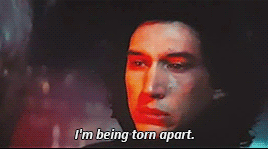Thresholds
Kate Whittaker Cousino | Jun 2, 2016
Years ago a friend introduced me to the word “liminality.” She would probably appreciate how aware I have since become of the spaces between things—the borders between people, between ideas, between the grasped ideal and the lived experience, between the past and the future. More than anything, my experience of the spaces in between, the edge places that are neither one thing or the other—or are perhaps both one thing and the other—is one of tension, the awareness of a journey without signposts, one that will require more or different tools than I presently have.
When you are in a border space, a place of tension, you can feel like you are being pulled apart.

But liminal spaces are not merely borders, and this is where the word is important. They are thresholds, points of entry or movement from one place to another. In the Star Wars movie The Force Awakens, Kylo Ren feels torn apart because he cannot continue in the direction he is heading and retain human, healthy ties of family and sentiment. Standing in that liminal moment, he is torn by the tension—and he is also faced with a choice. Continue down the dark path before him, or turn back?
And perhaps that is part of the tension of liminality for the rest of us. The thresholds of becoming in our lives are rarely so obvious and clear-cut as Ren’s—and perhaps Ren’s journey will not, over the course of the rest of the trilogy of movies, be so finally decided as he then thinks. But while there may be more doorways and choices ahead, each threshold can only show us a small, short glimpse of what lies ahead for us. Each point of change—change of condition, vocation, direction, belief, understanding—asks us to move at least somewhat blindly into an existence that we cannot really know, to make a choice that we cannot fully understand, not knowing what it will mean to us.
Last night, our family bedtime reading included the beginning of the journey of the Fellowship of the Ring. On the threshold of Rivendell, the company stands with the Last Homely House behind them and the long journey south still ahead. Elrond’s words of parting struck me and have stayed with me today:
“At that moment Elrond came out with Gandalf, and he called the Company to him. ‘This is my last word,’ he said in a low voice. ‘The Ring-bearer is setting out on the Quest of Mount Doom. On him alone is any charge laid; neither to cast away the Ring, nor to deliver it to any servant of the Enemy nor indeed to let any handle it, save members of the Company and the Council, and only then in gravest need. The others go with him as free companions, to help him on his way. You may tarry, or come back, or turn aside into other paths, as chance allows. The further you go, the less easy it will be to withdraw; yet no oath or bond is laid on you to go further than you will. For you do not yet know the strength of your hearts, and you cannot foresee what each may meet upon the road.’
‘Faithless is he that says farewell when the road darkens,’ said Gimli.
‘Maybe,’ said Elrond, ‘but let him not vow to walk in the dark, who has not seen the nightfall.’
‘Yet sworn words may strengthen the quaking heart,’ said Gimli.
‘Or break it,’ said Elrond. ‘Look not too far ahead! But go now with good hearts!’”
Perhaps here is both the source and the remedy to the almost unbearable tension of the threshold, the fear of committing ourselves when we cannot know what lies beyond. Only rarely are we bound by oaths to walk to the furthest limits of the unknown—at marriage, ordination, religious life. Even in these states, even when vowed, we still retain an inalienable freedom—we are still faced with the frightening freedom to tarry, move back, or turn aside. This is only more true of our other human endeavours.
The tension of the in-between spaces can drive us to speed through them, to choose poorly out of the desire to have the choosing, the changing, the loss of what-was or the pain of becoming what-will-be pass more quickly. Like Ren, will that tension lead us to choose poorly? Like Gimli, do our own ideals and desire to do what is good and right drive us to underestimate the trials ahead of us? And what richness of growth and wisdom do we miss out on by rushing through the in-between spaces, which have so much to teach us about ourselves?
“Look not too far ahead! But go now with good hearts!”
I have learned one more thing, in my experience living in liminality: Christ is here, too.

He tells us, “Behold, I stand at the door and knock.” He waits to change us—to make us new men and women. If I stand still and let him across the threshold of my heart, he will walk with me across the thresholds of my life, each in its own time. And I, like the young prophet Samuel, can say with fear and trembling but a good heart, “I will go, Lord”—although, like Frodo, “I do not know the way.”
